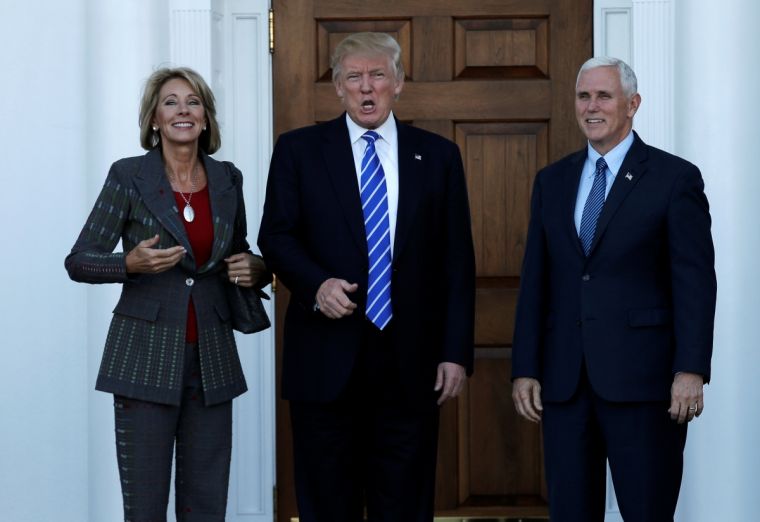Betsy DeVos: Five Reasons Christians Love And Hate Trump's New Education Secretary
Typically one of the least headline-grabbing roles in the Cabinet, Trump's appointment for education secretary, Betsy DeVos, has proved one of his most controversial.
Much to the President's irritation, Senate offices have received more calls urging opposition to DeVos than to any other cabinet nominee.
It is a disgrace that my full Cabinet is still not in place, the longest such delay in the history of our country. Obstruction by Democrats!
— Donald J. Trump (@realDonaldTrump) February 8, 2017
An unconvincing performance at her confirmation hearing where she failed to answer a number of questions led to a tiebreak-vote on Tuesday on whether to approve her. Vice-President Mike Pence, as president of the Senate, had to cast the deciding vote to ensure she passed the otherwise 50-50 split.
Despite being raised an evangelical Christian with strong conservative beliefs, a large segment of DeVos' opposition has been from her own evangelical community. Equally a number of key evangelical leaders have voiced resounding support.
So what exactly has inspired to much irritation and affection, both within and outside the evangelical community?
Here are five facts to love or hate about Betsy DeVos:

1. Her roots are in Christian Reformed education:
DeVos grew up in Christian schooling from the reformed tradition – she graduated from Holland Christian Schools, Michigan and then from Calvin College in Grand Rapids, also Michigan.
More recently she has been a member and elder at the evangelical megachurch Mars Hill under controversial and more socially liberal pastor Rob Bell.
2. DeVos supports vouchers for private schools:
School vouchers allow parents to use public money allocated to their child and spend it on private education, including separate religious schools.
Advanced by DeVos and a number of civil liberty projects plus some conservative Christians, they afford parents more choice in schooling other than the local publically-provided schools.
But they are criticised for being a means of funnelling state money into private religious projects which can teach extreme positions on creation and sex education.
3. She has almost no experience in public schooling:
Despite more than 90 per cent of America's children passing through the local public school system, DeVos has never attended, taught, or sent her children to public schools.
Her experience is limited to mentoring and raises fears public schools will be sidelined in her desire to further parental choice and schools vouchers.
The Expectations Project, a nonpartisan Washington based campaign group, urged DeVos to remember Jesus' command in Matthew 25 to care for "the least of these".
As many as 95 per cent of Protestant pastors believe Christians should help public education and the Project's letter reflects a concern that the poorest students who have no choice but to attend public schools will not receive the funding and attention they need under DeVos' regime.
4. She wants to "advance God's kingdom" through education:
An oft-quoted audio recording from 2001 has earned much of her evangelical support.
The clip was obtained by Politico and was taken from a gathering of Christian philanthropists including DeVos and her husband Dick, who have donated large sums to education projects.
"Our desire is to...confront the culture in which we all live today in ways which will continue to advance God's kingdom, not to stay in our own safe territories," says Betsy.
Her husband adds it would be easier to work in the "safe territories" of Christian schools but they wanted to take a more holistic approach to "drive better performance across all education".
5. Evangelical support has been very mixed:
Despite her promotion of Christian education and home schooling, evangelicals are decidedly mixed in their reaction to DeVos' appointment.
More than 2,700 of her fellow Calvin College alumni have signed a petition to oppose her selection, saying she is not quailfied.
Most of these are from the more liberal end of the evangelical spectrum and oppose her for beliefs about education rather than religious reasons, according to Politico.
And many agree with The Exectations Project that her approach will leave out "the least of these".











